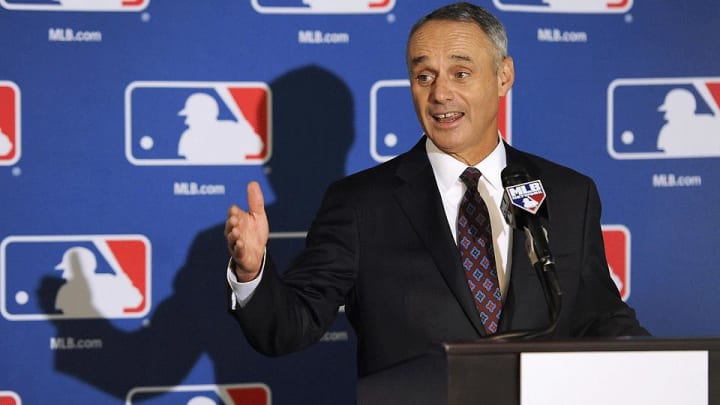The expected choice, Rob Manfred is elected the new MLB commissioner

Rob Manfred was elected the tenth commissioner of baseball on Thursday evening at the owners’ meeting in Baltimore. As MLB’s chief operating officer, Manfred has been outgoing commissioner Bud Selig’s second in command and was his presumptive successor, making Thursday’s result an expected one. Indeed, in the press release announcing Manfred’s promotion to COO in September just days after Selig’s retirement announcement, Selig described the move one that would “facilitate an orderly transition.” As such, the election of Manfred represents an unprecedented continuity in leadership for MLB.
Selig, who will pass the job over to Manfred at the end of his current contract on January 24, is not only the second-longest serving commissioner in the game’s history (his 22 years at the helm falling just two shy of Kenesaw Mountain Landis’s 24), but is, after Ford Frick, just the second to relinquish the job voluntarily (two died in office, six others were forced out). Fay Vincent effectively succeeded A. Bartlett Giamatti after the latter’s death in 1989, but the two together served fewer than four years in the office. In the 55-year-old Manfred, Selig is passing the position on to a man who has worked in the commissioner’s office for 16 of Selig’s 22 years at the helm and was outside counsel to the owners during the 1994 strike.
Indeed, beyond the rather drastic cosmetic difference between the aging, rumpled, gloomy, mush-mouthed Selig and the relatively young, tidy Manfred -- with his close-cropped hair, upright posture, upstate New York accent and easy smile -- it’s unlikely that there will be much noticeable difference between the Selig and Manfred administrations. In the short term, the latter will be in many ways a continuation of the former. Manfred indicated as much in his comments to the press upon being introduced as the next commissioner Thursday evening, calling Selig “a friend and mentor,” adding, “I will perform as the tenth commissioner in a way that will add to his great legacy.”
Over the last 20 years, Manfred has been a key figure in two major areas that will be significant parts of Selig’s legacy: labor relations and drug testing. After serving as counsel to the owners in 1994, Manfred joined the league as a member of the Player Relations Committee in 1998 and was the point man in negotiations with the union in 2002, 2006, and 2011. He can already boast of having had a hand in the last dozen years of labor peace. In the same role, he has been instrumental in Baseball’s efforts to first implement then strengthen its performance-enhancing drug testing program, taking a very public role in that ongoing struggle as the primary spokesperson in January’s 60 Minutes piece on Biogenesis and Alex Rodriguez. As such, anyone hoping for a new approach to either issue from the new commissioner is likely out of luck.
The Strike: Who was right, who was wrong and how it helped baseball
Given the fluidity of this transition it was interesting to hear Cardinals chairman Bill DeWitt, who headed the succession committee, praise Manfred for “his ability to reach consensus,” a trait often associated with Selig, who did so one last time by securing Manfred’s unanimous election. Selig, meanwhile, pointed out that he has “worked with Rob on a daily basis for a long time,” adding that in “the last couple years he has dealt in every area.”
Manfred does differ from Selig in terms of his professional background, however. Selig came to the commissioner’s office as a businessman, a former used-car dealer and owner of the Milwaukee Brewers (he remains the only man ever to be both an MLB owner and commissioner). Manfred, by comparison, is a lawyer, a graduate of Cornell and Harvard Law School, making him the fifth of baseball’s ten commissioners to hang a law degree on the office wall, joining Landis, Happy Chandler, Bowie Kuhn, and Vincent.
Manfred was officially elected unanimously by the 30 owners on Thursday, but according to reports he fell exactly one vote short of the 23 needed for election in the first two votes taken. The other eight votes in both cases went to Manfred’s lone opposition, current Boston Red Sox chairman Tom Werner. A third finalist, MLB’s executive vice president for business Tim Brosnan, dropped out of the running before the voting began. It seems very likely that there were more than three votes held, as Selig said at the introductory press conference that there were “a significant number of votes” and also described the ultimate result as “what the majority, over three quarters, wanted.” Most likely the final unanimous vote was held for the sake of appearances. Per CBS Sports’ Jon Heyman, the seven teams that held out against Manfred were the White Sox, whose owner Jerry Reinsdorf was said to be leading the opposition to Manfred, whom he believed was soft on the union, the Red Sox (Werner’s team), the Angels, A’s, Blue Jays, Diamondbacks, and Reds.

Cliff Corcoran is a contributing writer for SI.com. He has also edited or contributed chapters to 13 books about baseball, including seven Baseball Prospectus annuals.